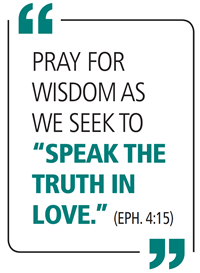Dear Friend,
In recent months, conversion therapy has received a lot of attention at all levels of government across Canada. But what exactly is conversion therapy?
In the past, some doctors and therapists would prescribe psychotropic drugs or use electric shock or aversion therapy to try to eradicate same-sex attraction. Patients were often coerced or forced to undergo such treatments. These long-discredited practices are damaging and wrong. It is believed that such harmful efforts to change a person’s sexual orientation or gender identity no longer take place in Canada.
Today, conversion therapy is usually understood to be any medical or therapeutic effort aimed at trying to change a person’s gender identity or sexual orientation. However, conversion therapy is increasingly being discussed in much broader terms, extending to voluntary attempts to reduce sexual behaviour, and often referring to pastoral care or informal support groups in religious settings.
Several municipalities and provinces across Canada have recently banned conversion therapy or are in discussions to do so. In 2015, Ontario and Manitoba banned conversion therapy by health care practitioners. In 2018, Nova Scotia banned conversion therapy by any “person in a position of trust or authority towards a young person.” Only therapies that support identity exploration or provide “gender confirming” care (including sex-change surgery) are permitted. Cities like Vancouver, Sherwood Park, St. Albert and Edmonton have passed local bans.
In his mandate letter (December 2019), the Prime Minister tasked the Minister of Justice with amending “the Criminal Code to ban the practice of conversion therapy and take other steps required with the provinces and territories to end conversion therapy in Canada.”
The problem is that conversion therapy may be so broadly defined that it limits freedoms of speech and religion. Could these bans capture faith-based teachings on sexuality or spiritual guidance that is given to a young person? Could they prohibit caring pastors or loving parents from responding to requests for help – based on their understanding of the young person’s personality, history and needs; their desire to seek what’s best for the young person; and their moral and religious worldview?
A current Senate bill proposes to amend the Criminal Code to make it an offence to “advertise conversion therapy services for consideration,” or to “obtain a financial or other material benefit for the provision of conversion therapy to a person under the age of eighteen.” The bill defines conversion therapy as "any practice, treatment or service designed to change an individual’s sexual orientation or gender identity, or to eliminate or reduce sexual attraction or sexual behaviour between persons of the same sex."
While this Senate bill should not directly impact faith communities, we are concerned that future legislation might adopt this definition of conversion therapy, which could then limit religious freedom.
As policymakers seek to protect individuals from harm, it’s critical to ensure that conversion therapy is defined in a way that does not infringe on expression of religious belief, religious instruction or the provision of pastoral care. It is also important to ensure that persons seeking to work through questions regarding their sexual orientation or gender identity continue to have access to the professional and/or spiritual guidance they seek to live according to their beliefs and wishes. Individuals should remain free to voluntarily seek help to resolve or manage unwanted sexual attractions or behaviours (for religious reasons, for example).

We must protect human dignity and the equality of all Canadians by discouraging harmful and demeaning practices. But faith communities should not be prohibited from offering spiritual care that is voluntarily sought out and received, or from offering biblical truths on matters of sexuality. We want to uphold and protect freedom of religion and expression while affirming the value and worth of all people, treating everyone with dignity and respect as those created in God’s image and loved by Him. We seek to honour God and love our neighbour.
This issue of conversion therapy is likely to be at the forefront of public debates this year. Please pray for us as we seek to engage thoughtfully and constructively in a measured and compassionate way. Your support enables us to monitor, research and respond to these complex issues in a way that is relevant and Christ-honouring.
The EFC is monitoring the development of conversion therapy bans closely. If the Senate bill passes Second Reading, the EFC is prepared make a submission to the Senate Committee. And when a bill is introduced in the House of Commons, we will make resources available to help our constituents engage with their MPs. We want policies that uphold freedom of religion and expression and respect people’s freedom to seek counselling support for struggles related to identity, sexuality, and gender.
Please pray for wisdom as we seek to “speak the truth in love” (Eph 4:15) on this difficult and sensitive issue with “with compassion, kindness, humility, gentleness and patience” (Col 3:12). Pray as well for our political leaders and for our country. And finally, please make a gift today in support of the EFC as we defend the religious freedoms of our churches, our religious leaders, our parents, and indeed, our precious young people!
Bruce Clemenger
President